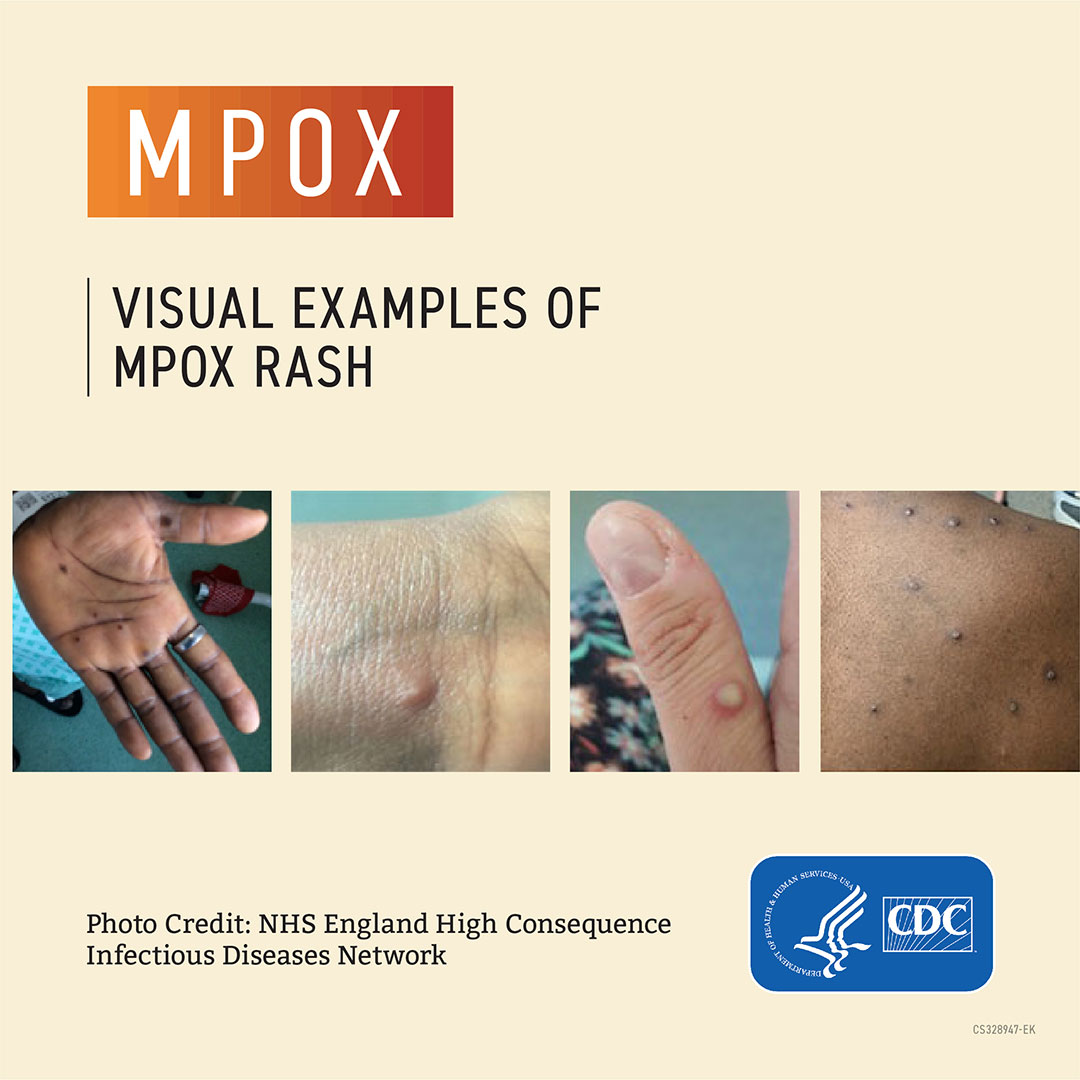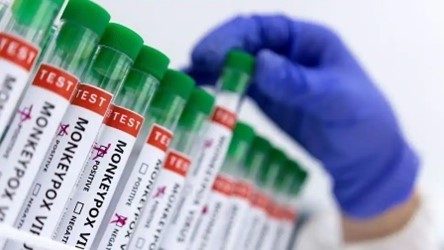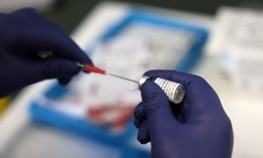MPox
What is Mpox (an orthopox-virus)?
Mpox is a contagious disease and is caused by the same family of viruses that causes smallpox. Mpox symptoms are like smallpox, but milder and rarely fatal.
An individual can get the virus when they contact the sores, scabs, or body fluids of an infected person. Infections occur through close, intimate situations, such as cuddling, kissing and sexual contact and by touching contaminated materials, such as clothing, bedding and other linens used by an infected person. This illness can also be spread through respiratory secretions after prolonged face-to-face contact.
Symptoms of Mpox:

Rash; that looks like pimples or blisters that appears on the face, inside the mouth, and on other parts of the body, like the hands, feet, chest, genitals, or anus.
Fever
Chills
Headache
Muscle aches
Fatigue
Swollen lymph nodes
A rash typically develops a few days after the early symptoms. However, not all individuals infected with mpox develop any symptoms prior to rash. some persons with mpox only have a few sores. It is critical that people who believe they were exposed to the virus and develop a rash get tested to limit the spread of the disease. The illness typically lasts 2-4 weeks.
Get tested for mpox

A variety of health care facilities (emergency departments, urgent cares, clinics, hospitals, etc.) are testing patients with possible mpox symptoms. Health care providers throughout the county can also order tests through commercial laboratories. Health care providers can also consult with the Delaware County Department of Health about testing via the state’s public health laboratory for limited cases.
How is testing done?
It is painless, easy and non-invasive. It is done by swabbing. Providers will follow the guidelines of the laboratory they are using for the test.
I was exposed, what should I do?
See a healthcare provider if you notice a new or unexplained rash or other mpox symptoms.
Remind the healthcare provider that mpox is circulating.
Avoid close contact (including intimate physical contact) with others until a healthcare provider examines you.
Avoid close contact with pets or other animals until a healthcare provider examines you.
If you’re waiting for test results, follow the same precautions.
If your test result is positive, stay isolated until your rash has healed, all scabs have fallen off, and a fresh layer of intact skin has formed.
If you have a rash and believe it could be mpox, please see your healthcare provider. If you have questions you can call the DCHD Wellness line at (484) 276-2100 or via email at Email: DelcoWellness@co.delaware.pa.us.
Protect yourself from getting mpox
WHAT TO AVOID?
Certain behaviors can greatly reduce, if not eliminate, a person’s chances of being infected with mpox.
The most effective ways to prevent getting the virus are:
Avoid contact with people who may be infected
Avoid skin to skin contact with someone with a rash
Practice safe sex, including the use of condoms and dental dams
Avoid contact with bedding and other materials contaminated with the virus
Do not sharing eating utensils, cups, or food with a person with mpox
Wash your hands with soap and water
Use personal protective equipment (PPE) when caring for infected persons
Get vaccinated for mpox

The vaccine can prevent disease if given within four days of exposure to the virus. Additionally, if administered up to 14 days after exposure, getting the Mpox vaccine could reduce the severity of disease.
Click here to locate where to get the Mpox vaccine. Mpox vaccine is available at DCHD – please contact us via the DCHD Wellness line at (484) 276-2100 or via email at DelcoWellness@co.delaware.pa.us to help you evaluate your risk and schedule an appointment.
U.S. Mpox Case Counts by State
https://www.cdc.gov/poxvirus/monkeypox/response/2022/us-map.html
General Resources
CDC’s Get Healthy and Ready for Summer 2023
HHS’s Resources on Ways Communities Can Stay Protected from Mpox in Advance of Summer Months
CDC’s website for 2022 Mpox Outbreak
Pennsylvania’s Department of Health Mpox website
PADOH Mpox Factsheet
DCHD Mpox Factsheet for K-12 and Early Childcare Providers
Free Mpox Vaccines Resources
Mpox Risks - Let's Talk About Mpox
Mpox Risks - Let's Talk About Mpox - Spanish
For Health Professionals
Pennsylvania Department of Health’s Health Alert Network Advisories
5/17/2023 - Potential Risk for New Mpox (Monkeypox) Cases
7/28/22 - Revised Protocols Regarding the Use of Tecovirimat (TPOXX) for the Treatment of Mpox
7/8/22 - the Addition of Commercial Labs for Monkeypox Virus Testing
6/23/22 - Updated Recommendations for Monkeypox Case Identification and Testing
For more information and assistance, the Delaware County Health Department Wellness Line is available 24 hours a day, 7 days a week. In addition to responding to phone calls, the Wellness Line also responds to email inquiries.
Phone: (484) 276-2100 (Available 24/7)
Email: DelcoWellness@co.delaware.pa.us
